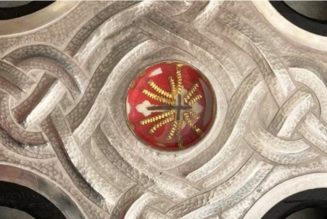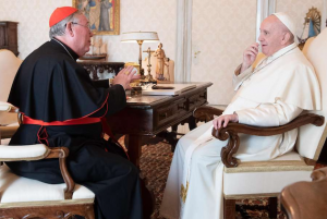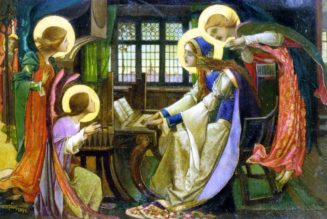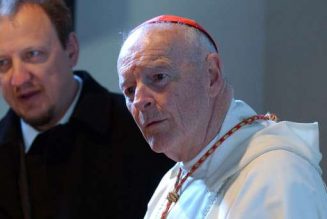, August 5, 2021
 In the Gospel for the 19th Sunday of Ordinary Time Year B, Jesus speaks to a congregation much like most Catholic congregations in the Church today.
In the Gospel for the 19th Sunday of Ordinary Time Year B, Jesus speaks to a congregation much like most Catholic congregations in the Church today.
Like them, we are here, listening, though we have mixed motives for being here; we believe, though our faith is weak; and we still identify as Catholics, though the Church’s witness is often sickeningly compromised — we are here still, because despite it all, Jesus still commands our attention.
The Jews murmur about Christ. Just like us.
Sunday’s Gospel begins with the Jewish leaders murmuring about Jesus because he said, “I am the bread that came down from heaven.”
The claim seems insane to them. “Is this not Jesus, the son of Joseph? Do we not know his father and mother?” they ask. “Then how can he say, ‘I have come down from heaven’?”
It’s as if they are saying, “How can this mere man claim so much? How can he demand that we believe in him, and him alone? He’s just a guy from Nazareth. Who is he kidding?”
Before we feel too superior to them, we should realize that we murmur in exactly the same way today. How can the Church say it’s the body of Christ drawing its life from Jesus himself? Too often, it is worse than human; it is ugly.
As Cardinal Joseph Ratzinger put it in his Way of the Cross meditations in 2005, days before he would become Pope Benedict XVI, the Eucharist seems to have done nothing for so many Catholics, or worse than nothing:
“How often is the holy sacrament of His Presence abused, how often must he enter empty and evil hearts! How often do we celebrate only ourselves, without even realizing that he is there! How often is his Word twisted and misused! What little faith is present behind so many theories, so many empty words! How much filth there is in the Church, and even among those who, in the Priesthood, ought to belong entirely to him! How much pride, how much self-complacency!”
Sixteen years later, the Church looks just as bad, or worse. Journalists are exposing filth in seminaries, bishops’ residences and the Vatican itself, and our murmuring is louder than ever.
We are angry at the bishops and schools for their failure at Catechesis; angry at parishes for how they responded to the pandemic; angry at one set of Catholics for being embarrassed by the teachings of the Church; angry at another set for being more Catholic than the pope. There are the sexual sins of priests, which range from violating their vow of celibacy to child abuse; and the sexual sins of lay people, which are worse — ranging from extra-marital sex to pornography and sex trafficking, from redefining marriage to the widespread slaughter of unborn children for profit, made possible by Catholic politicians, Catholic voters, and Catholic customers.
How could this possibly be the body of Christ, the one, holy Catholic and apostolic Church?
St. Paul spells out exactly the kind of attitude we have among us.
“Do not grieve the Holy Spirit of God” with your speech, he says. He spells out what he wants stopped, and it reads like a description of what is on offer from Catholics online this summer:
“All bitterness, fury, anger, shouting and reviling must be removed from you, along with malice.”
All bitterness: All holding grudges, all silent rage, all words of disgust about this pastor, that bishop, those cardinals, the Pope.
All fury: All longing for vengeance, all “lust for punishment” against fellow Catholics who are wayward.
All anger, the hot coals of hatred that flame up from our hearts.
All shouting and reviling, when we put the bad guys in the Church in their place with an exquisite online insult, or when we eagerly spread the unsavory scandals that undermine the faith of our neighbors and loved ones.
“These things must be removed from among you, along with malice,” says St. Paul. He adds malice, says one ancient commentator, because “some repress anger and clamor yet still remain disobedient” by “putting on a face of peace while holding on to discord within the soul.” Some of us never share the malice in our hearts. But it is still there.
So before we worry about the “murmuring Jews” we need to look to ourselves, and approach the Church, the body of Christ, by being “compassionate, forgiving one another as God has forgiven you in Christ.”
He sums up: “Be imitators of God, as beloved children, and live in love.”
How is anyone supposed to do that? In the face of the “filth” in the Church, are we supposed to just shut up and smile?
No; St. Paul is not saying that Catholics should ignore evil in the Church. The Letter to the Ephesians is, in fact, an example of St. Paul not ignoring evil in the Church. Those of us who are Church officials large and small, journalists, and law enforcement officers should all take note.
But even they, and the rest of us especially, need to create a Christian community polarized by love, not by rage.
After all, says St. Paul, in the face of our own lives of sin and betrayal, Jesus himself “handed himself over for us, as a sacrificial offering to God for a fragrant aroma.”
That gives Jesus the right to say: “Stop murmuring among yourselves.” He adds: “No one can come to me unless the Father who sent me draw him.”
St. Augustine compares that phrase about being drawn by the Father to Virgil’s Trahit sua quemque voluptas, “Each is led by his own pleasure.” If we delight in scandal-mongering and online outrage, we will tear the Church apart. If we are “delighted with truth, happiness, justice and eternal life,” we will be drawn to Christ, and we will stop murmuring.
Ultimately, the Eucharist itself is the greatest answer to our bitterness and disillusionment.
“Taste and see the goodness of the Lord,” we pray in Sunday’s Psalm. “Look to him that you may be radiant with joy.”
Think of it this way: Like Adam and Eve, we are still drawn, not by fidelity to the Father, but by our desire for the forbidden fruit, which we hope will make us like God. In a startling and profound answer to our betrayal, Jesus himself takes the place of the fruit, becoming the “Bread from heaven,” so that we can taste divinity itself.
St. Ambrose described that line “Taste and see” in beautiful words that influenced Augustine.
“In Christ we possess everything,” he said. “Let every soul approach him, whether it is sick with the sins of the flesh, fastened by the nails of worldly desires, admittedly still imperfect, progressing by intense medication or already perfect in its many virtues. Everyone is in the Lord’s power, and Christ is all things to us. If you desire to heal your wounds, he is your doctor; if you are on fire with fever, he is your fountain; if you are burdened with iniquity, he is your justification; if you need help, he is your strength; if you fear death, he is your life; if you desire heaven, he is your way; if you are fleeing from darkness, he is your light; if you are seeking food, he is your nourishment. Taste and see that the Lord is good. Happy is the one who takes refuge in him.”
We may be like Elijah in the First Reading, fleeing and wishing we were dead, feeling disillusioned and alone. An angel came to him. The Lord himself, truly present in the Blessed Sacrament, comes to each of us to encourage and revive us to journey on.
The whole history of the Church is a history of betrayal followed by rebirth; sinners side by side with saints; the Church on the brink of disaster and on the cusp of glory. The Eucharist is the pledge that Jesus Christ himself, the life of the Church, will always prevail. He always has, and he always will; even now.
Image: Estudio de Arquepoetia y Visualistica Prospectiva, Flickr.
Tags: 19th Sunday in Ordinary Time Year A, 19th SUnday in Ordinary Time Year B, prayer, Sunday Gospel, Sunday Readings
Never miss a post! Subscribe below to our weekly newsletter.
Related
Join Our Telegram Group : Salvation & Prosperity









